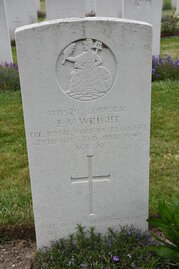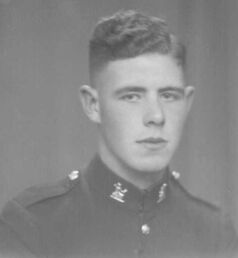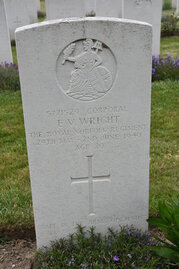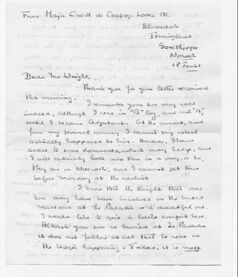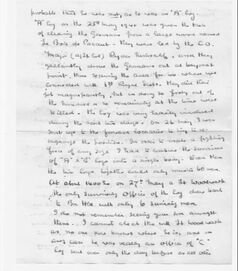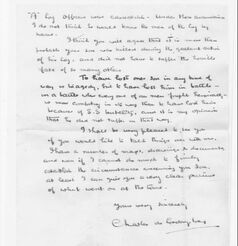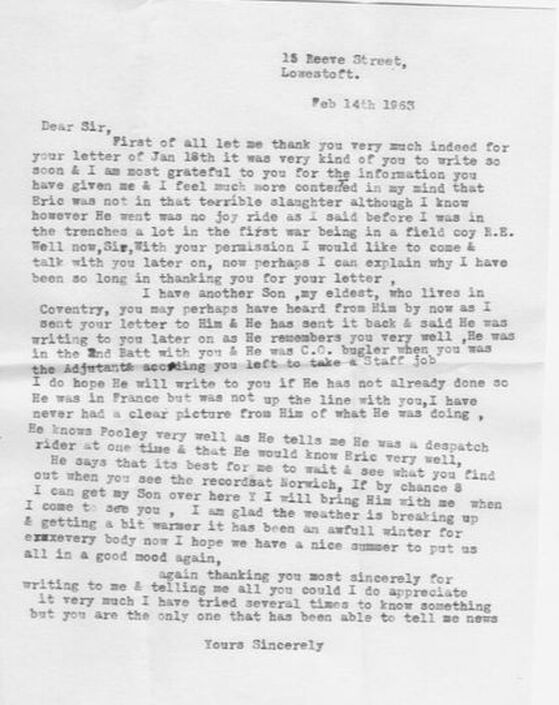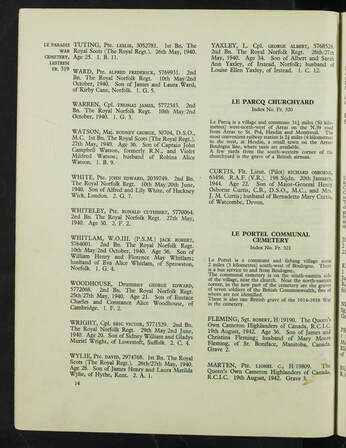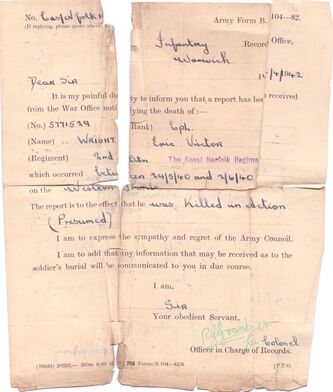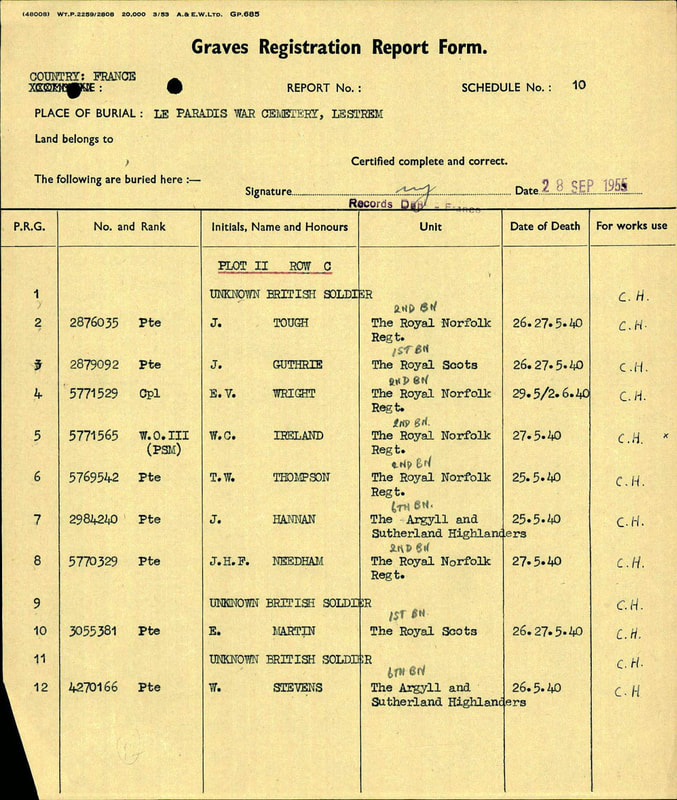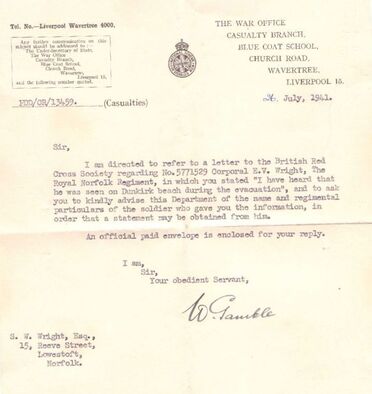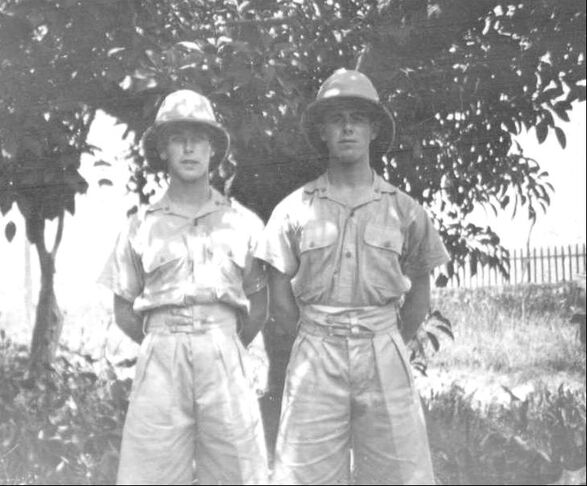Corporal Eric Victor Wright
Corporal Eric Victor Wright
Royal Norfolk Regiment
Died May 29th-June 2nd, 1940
Son of Sidney William and Gladys Muriel Wright, of Lowestoft, Suffolk.
Inscription - Safe in the arms of Jesus
Royal Norfolk Regiment
Died May 29th-June 2nd, 1940
Son of Sidney William and Gladys Muriel Wright, of Lowestoft, Suffolk.
Inscription - Safe in the arms of Jesus
Below is a letter sent to Corporal Eric Wright's father Sidney by Major Charles Long. Below that is a transcript of the letter.
From Major C.W.H de Corday-Long MC Elmendale
Irmingland
Saxthorpe
Norwich
18 Jan 63
Dear Mr Wright
Thank you for your letter received this morning.
I remember your son very well indeed, although I was in “B” Coy and not “A”, until I became Adjutant. At the moment, and from my personal memory, I cannot say what actually happened to him. However, I have access to some documents which may help, and I will certainly look into them in a day, or so, they are in Norwich, and I cannot get there before Monday at the earliest.
I know that the thought that one’s son may have been involved in the brutal massacre at Le Paradis is a dreadful one. I would like to give a little comfort here. Although your son is buried at Le Paradis it does not follow at all that he was in the tragic happening. Indeed, it is most probable that he was not, as he was in “A” Coy. “A” Coy on the 25th May 1940 was given the task of clearing the Germans from a large wood named Le Bois de Pacaut – they were led by the C.O. Major (A/Lt Col) Ryder himself, and they gallantly drove the Germans out at bayonet point, thus securing the area for us where we connected with the 1st Royal Scots. They did this job magnificently, but in doing so forty out of the hundred or so remaining at the time were killed. The Coy was very heavily involved during the next two days. On 26 May I was sent up to the forward location to try to reorganize the position. In order to make a fighting force of any size I had to combine the survivors of “A” and “B” Coys into a single body. Even then the two Coys together could only muster 60 men. At about 1400 hrs on 27th May a Lt. Woodwark the only surviving officer of the Coy drew back to Bn HQ with only 6 surviving men. I do not remember seeing your son amongst them. I cannot check this with Lt Woodwark as no one now knows where he is, and in any case he was really an officer of “C” Coy sent over only the day before as all other “A” Coy officers were casualties. Under those circumstances I do not think he would know the men of the Coy by name.
I think you will agree that it is more than probable your son was killed during the gallant action of his Coy, and did not have to suffer the horrible fate of so many others.
To have lost ones son in any kind of way is tragedy, but to have lost him in battle – in a battle where everyone of our men fought heroically – is more comforting in its way than to have lost him because of S.S. brutality, and it is my opinion that he did not suffer in that way
I shall be very pleased to see you if you would like to talk things over with me. I have a number of maps, drawings and documents and even if I cannot do much to firmly establish the circumstances concerning your son, at least I can give you a very clear picture of what went on at the time.
Yours very sincerely
Charles de Corday-Long
Irmingland
Saxthorpe
Norwich
18 Jan 63
Dear Mr Wright
Thank you for your letter received this morning.
I remember your son very well indeed, although I was in “B” Coy and not “A”, until I became Adjutant. At the moment, and from my personal memory, I cannot say what actually happened to him. However, I have access to some documents which may help, and I will certainly look into them in a day, or so, they are in Norwich, and I cannot get there before Monday at the earliest.
I know that the thought that one’s son may have been involved in the brutal massacre at Le Paradis is a dreadful one. I would like to give a little comfort here. Although your son is buried at Le Paradis it does not follow at all that he was in the tragic happening. Indeed, it is most probable that he was not, as he was in “A” Coy. “A” Coy on the 25th May 1940 was given the task of clearing the Germans from a large wood named Le Bois de Pacaut – they were led by the C.O. Major (A/Lt Col) Ryder himself, and they gallantly drove the Germans out at bayonet point, thus securing the area for us where we connected with the 1st Royal Scots. They did this job magnificently, but in doing so forty out of the hundred or so remaining at the time were killed. The Coy was very heavily involved during the next two days. On 26 May I was sent up to the forward location to try to reorganize the position. In order to make a fighting force of any size I had to combine the survivors of “A” and “B” Coys into a single body. Even then the two Coys together could only muster 60 men. At about 1400 hrs on 27th May a Lt. Woodwark the only surviving officer of the Coy drew back to Bn HQ with only 6 surviving men. I do not remember seeing your son amongst them. I cannot check this with Lt Woodwark as no one now knows where he is, and in any case he was really an officer of “C” Coy sent over only the day before as all other “A” Coy officers were casualties. Under those circumstances I do not think he would know the men of the Coy by name.
I think you will agree that it is more than probable your son was killed during the gallant action of his Coy, and did not have to suffer the horrible fate of so many others.
To have lost ones son in any kind of way is tragedy, but to have lost him in battle – in a battle where everyone of our men fought heroically – is more comforting in its way than to have lost him because of S.S. brutality, and it is my opinion that he did not suffer in that way
I shall be very pleased to see you if you would like to talk things over with me. I have a number of maps, drawings and documents and even if I cannot do much to firmly establish the circumstances concerning your son, at least I can give you a very clear picture of what went on at the time.
Yours very sincerely
Charles de Corday-Long
The letter below is Sidney Wright's response to Major Charles Long's letter. Sidney is the father of Eric Victor Wright.
